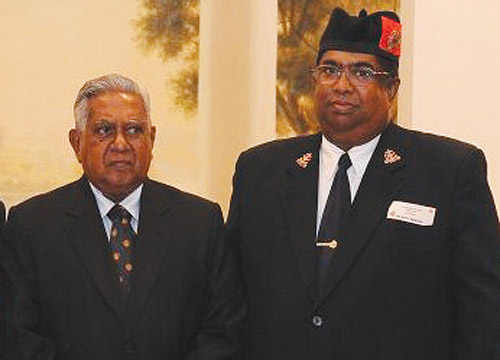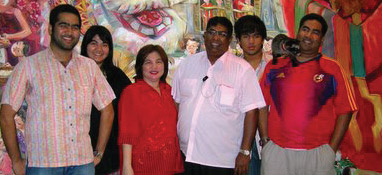To: The Body of Christ in Malaysia
A CALL TO PRAYER FOR THE CHURCH & OUR NATION MALAYSIA
**********
INTRODUCTION
As Christians and God’s people in Malaysia,
• We are called to pray for our beloved country so that Habakkuk’s vision, “For the earth will be filled with the knowledge of the glory of the LORD, as the waters cover the sea” (Habakkuk 2:14), will be fulfilled in our land.
As Christians and God’s people in Malaysia,
• We believe that God’s message to His people through Jeremiah, “Seek the welfare of the city where I have sent you … and pray to the LORD on its behalf, for in its welfare you will find your welfare” (Jeremiah 29:7), is also His word for us today.
I. THE CHURCH—HOLY, REVIVED & VIBRANT
1. Humbling Ourselves to Seek God in Prayer
In Acts 1 we read of how a ten-day prayer meeting preceded the release of the Holy Spirit at Pentecost. Similarly, earnest and persistent prayer led to great revivals which had lasting and world-changing effects. These include the Moravian Revival (1727), the Great Awakening in America (18th century), the Welsh Revival (1904), the Azusa Street Revival (1906) and the Korean Revival (1907).
Closer to home, the several waves of revival experienced by the SIB have often been preceded and sustained by prevailing prayer and holy living. This has resulted in SIB being the fastest growing church in the country in the last few decades, with whole tribal communities being holistically transformed along the way.
a. Pray that the Malaysian church will seek the face of God together earnestly and with perseverance, so that He will open the heavens, reveal His glory and pour His power upon our nation. Let us claim His promise that “if my people … humble themselves, and pray, and seek my face and turn from their wicked ways, then I will hear from heaven and will forgive their sin and heal their land” (2 Chronicles 7:14).
2. Emphasising Holiness and Righteousness in the Church
The Malaysian church can only be a prophetic community, impacting society, when we live authentic and vibrant Christian lives. Only then the church can act and speak with credibility and moral authority, and be taken seriously by the world.
a. Pray that pastors, church leaders and members will strive to live godly lives at home, in church, and in the market place and the public square.
b. Pray that every church will provide systematic teaching on holy living from the pulpit, in our small groups, and at every level of church ministry.
3. Fostering Church Unity and the Ministry Of Reconciliation
We live in a society where ethnic tensions and divisions have deteriorated badly. But for the church, God has already brought peace and unity through the cross (Ephesians 2:14ff).
a. Pray that Christians will make every effort to keep the unity of the Spirit, embracing reconciliation within the Christian community.
b. Pray that as Christian leaders, local churches and whole denominations learn to live in unity, through forgiveness and reconciliation, we will model ethnic reconciliation powerfully in our nation.
4. Teaching Christians the Cost of Discipleship
We must be intentional in teaching that Jesus taught clearly that there is always a cost in following him as true disciples (Luke 9:23). One consequence of our failure here has been the mass exodus of Christians leaving the country through emigration, which has weakened both the church in Malaysia and our contribution to nation-building.
a. Pray that Christians will understand what true discipleship means, and be willing to take up their cross daily and suffer for Christ.
b. Pray that many Christian professionals and countless university students studying abroad will return with a clear vision to build both the church and nation.
c. Pray that Christian parents will encourage their children to come home or to remain in Malaysia to serve God here.
5. Developing Godly Leadership for Our Churches
There is a great need in our time for godly leaders who model Christ-like servanthood. Further, as Paul advised Timothy, “what you have heard from me … entrust to faithful men who will be able to teach others as well” (2 Timothy 2:2), we must intentionally disciple younger leaders.
a. Pray that church leaders, both pastoral and lay, will grow in depth and maturity as true shepherds of Christ. Pray that they will have a real hunger for God’s Word, a firm commitment to God’s truth and to live by it, and the courage to teach the same to their flocks.
b. Pray that the present generation of leaders will strive to lay strong foundations for churches and Christian organizations in our country, to model godly and humble servanthood, and to manage succession plans well, as they gradually hand over the baton of leadership to younger people.
6. Empowering Bumiputra Churches, Especially Those in East Malaysia
Based on Government Census of 2001, Bumiputras form some 60% of the Malaysian church. Their churches lack financial resources and are often weak due to insufficient teaching material. They have also been a major target of certain parties seeking to draw their members away. Many of the children and youths have been converted away from their Christian faith and heritage.
a. Pray for the increasing availability of both the Bible and discipleship materials in Bahasa Malaysia.
b. Pray for a growing and effective partnership in ministry and mission between the churches in West Malaysia and in East Malaysia.
c. Pray for the increasing emergence of strong churches among Bumiputra communities in our land, and the rising up of bold and God-fearing leaders among them.
II. THE ECONOMY—STRONG & GROWING, WITH A FAIR SHARE FOR ALL
7. Being “Salt and Light” in Our Nation
The church cannot remain silent, neutral or unmoved by the vital issues confronting us in our country’s economic development, especially if we are to fulfil our calling to “seek the welfare” (Jeremiah 29:7) of this nation.
a. Pray that God will continue to bless our nation with strong and steady growth of the national economy so that all citizens will be blessed. Pray for the equitable sharing of the wealth of this nation among all races.
b. Pray against the twin problems of badly formulated policies and prevalent corruption, both of which combine to adversely affect national economic growth.
c. Pray that the smaller and economically weaker communities will not be marginalised. In particular, pray that the rights and means of livelihood of the native people of Sabah and Sarawak, and the Orang Asli in West Malaysia will be legally recognised and safe-guarded, especially their land rights.
d. Pray that the church will take the lead in reaching out with concrete acts of love and compassion to the poor, including refugees and migrant workers, regardless of race or religion.
III. POLITICS AND THE GOVERNMENT: STABLE, CLEAN, DEMOCRATIC & JUST
8. Defending the Supremacy of the Federal Constitution and Fundamental Human Liberties
The defence of the supremacy of our Federal Constitution, fundamental human liberties, the principles of democracy and the rule of law in our country has now become increasingly critical. This is because of repeated and continuing efforts to undermine them, in particular, through certain Islamisation policies, which effectively marginalise believers of other faiths.
a. Pray that the church, civil society and the rakyat in general will defend the Federal Constitution so that fundamental liberties of all citizens, especially religious freedom, will be upheld.
b. Pray that the government will genuinely seek to uphold the principle of equal citizenship rights for all Malaysians, which had been forged originally against a diverse background of race, religion and culture. Pray against all efforts made at asserting ethnic and religious supremacy which, if unchecked, will destroy the foundations of our nation.
c. Pray that the democratic processes and institutions will mature and, if necessary, be revitalised in our country, especially the Parliament, State Assemblies, the Judiciary and the Civil Service.
9. Electing Politicians Who Are Competent and Genuine, and Committed to Integrity and Justice
Whilst the church does not identify herself with any particular political group, all Christians have a responsibility in a democracy to elect candidates who are competent and sincere in serving the rakyat, and who are noted for their integrity and commitment to justice.
a. Pray that our citizens will have the discernment and wisdom to elect sincere and politically competent leaders who will govern the nation with compassion, integrity, righteousness and justice.
b. Pray that Christians will take their responsibility as voters seriously and do what is right.
c. Pray that in the up-coming Sarawak State Elections on 16 April, and the General Elections which may follow shortly, that God will so overrule that governments which will be faithful to the mandate to rule for the good of the nation will come into power. Pray specially against the work of unseen spiritual powers that seek to keep the nation under their control through evil of all kinds.
10. Making Malaysia a Model Nation
The Malaysian church has an unprecedented opportunity in our generation to be used by God to bring about a powerful transformation which will result in blessings for all the peoples of our land.
a. Pray that Malaysia, by God’s grace, will develop into an advanced economy and a stable and harmonious democracy, in which all citizens are equal, with fundamental liberties protected by the Constitution and a legal framework which protect the weakest and the least. This will make Malaysia a model nation for others.
**********
CONCLUSION
As Christians and God’s people in Malaysia, we live, pray and labour in hope to be a blessing to our country!
“For I know the plans I have for you, declares the Lord, plans to prosper you and not to harm you, plans to give you a hope and future” (Jeremiah 29:11).
for list of Christian leaders endorsing this call,see
here
sign petition
here
The A Call to Prayer for the Church & Our Nation Malaysia Petition to The Body of Christ in Malaysia was created by and written by Pray4Malaysia Administrator (info@pray4malaysia.org).
.Labels: Christianity, Church, Malaysia, Prayer




























 Much has changed over the past few years. When I organized the first KBBC back in 2007, it was a much more parochial undertaking. Students at Princeton Theological Seminary (PTS) have, from time to time, joined together to form “reading groups” as a supplement to the official course offerings. Such groups are comprised of like-minded individuals who want to tackle a certain theological text or thinker, and who expect to come to a better understanding of the material through communal discussion rather than mere independent reading. The first KBBC was simply to be an online, blog-y version of this phenomenon. Thus, a number of my friends and colleagues took turns writing on the various chapters of Barth’s Protestant Theology in the Nineteenth Century (
Much has changed over the past few years. When I organized the first KBBC back in 2007, it was a much more parochial undertaking. Students at Princeton Theological Seminary (PTS) have, from time to time, joined together to form “reading groups” as a supplement to the official course offerings. Such groups are comprised of like-minded individuals who want to tackle a certain theological text or thinker, and who expect to come to a better understanding of the material through communal discussion rather than mere independent reading. The first KBBC was simply to be an online, blog-y version of this phenomenon. Thus, a number of my friends and colleagues took turns writing on the various chapters of Barth’s Protestant Theology in the Nineteenth Century (













